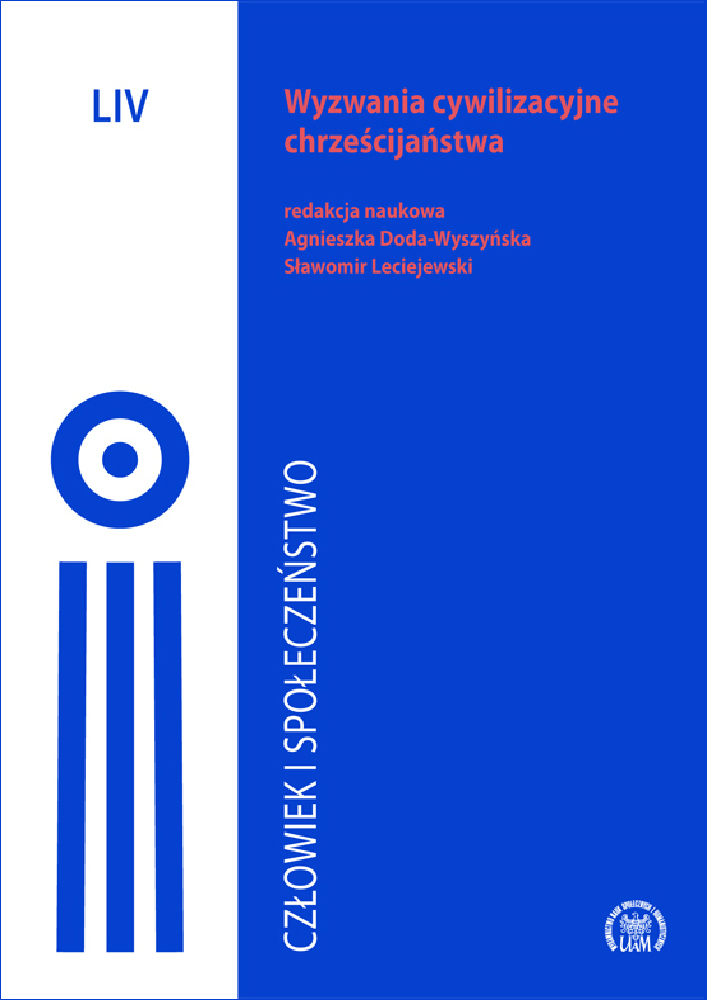Abstrakt
There is no doubt that the Catholic Church is in a deep crisis. On the one hand, it is internally divided between supporters of the changes initiated during the Second Vatican Council (1962–1965) and conservatives opposing these changes in the name of the (Counter-Reformation) decisions made during the Council of Trent (1545–1563). On the other hand, the Church is involved in a number of political, financial, paedophile, etc. scandals. They prove the progressive loss of contact of this institution with the world as a place to preach the Gospel. For both of these reasons, the number of believers in countries considered Catholic is steadily decreasing. The purpose of this article is to correct or supplement this diagnosis. Historically, the Catholic Church – like many other religious organizations – has never been „spotless”. However, this did not prevent Catholics from identifying themselves with this institution as the depository of the Revealed Truth. Today is different. Many of them are experiencing an identity crisis. They cannot reconcile the Gospel (which takes the form of religious dogma) with the existential and moral challenges they face every day. The subject of the research undertaken in this article is to find answers to the questions (1) about the skills that allow them to reconcile one with the other and (2) about the role of the Church in the education of the community of the faithful.
Bibliografia
Bacon, F. (1955). Novum Organum, tłum. J. Wikarjak. Warszawa: Państwowe Wydawnictwo Naukowe.
Bacon, F. (1995). Nowa Atlantyda i Z Wielkiej Odnowy, tłum. W. Kornatowski, J. Wikarjak. Warszawa: Wydawnictwo ALFA.
Bauman, Z. (2006). Płynna nowoczesność, tłum. T. Kuntz. Kraków: Wydawnictwo Literackie.
Bendix, R. (1975). Max Weber. Portret uczonego, tłum. K. Jakubowicz. Warszawa: Państwowe Wydawnictwo Naukowe.
Bourdieu, P., Wacquant, L.J.D. (2001). Zaproszenie do socjologii refleksyjnej, tłum. A. Sawisz. Warszawa: Oficyna Wydawnicza.
Certeau, M., de (2008). Wynaleźć codzienność. Sztuki działania, tłum. K. Thiel-Jańczuk. Kraków: Wydawnictwo UJ.
Habermas, J. (2002). Wierzyć i wiedzieć, tłum. M. Łukasiewicz. Znak, 9, 8–21.
Habermas, J. (2007). Strukturalne przeobrażenia sfery publicznej, tłum. W. Lipnik, M. Łukasiewicz. Warszawa: Wydawnictwo Naukowe PWN.
Hertz, A. (1994). Szkice o totalitaryzmie. Warszawa: Państwowe Wydawnictwo Naukowe. Jan św. (1991). Objawienie. Pismo Święte Starego i Nowego Testamentu. Poznań: Pallottinum.
Konersmann, R. (2009). Filozofia kultury. Wprowadzenie, tłum. K. Krzemieniowa. Warszawa: Oficyna Naukowa.
Krasnodębski, Z. (1999). M. Weber. Warszawa: Wiedza Powszechna.
Leder, A. (2013). Prześniona rewolucja. Ćwiczenia z logiki historycznej. Warszawa: Wydawnictwo Krytyki Politycznej.
Mannheim, K. (1992). Ideologia i utopia, tłum. J. Miziński. Lublin: Wydawnictwo Test.
McKenzie, J. (2011). Performuj albo... Od dyscypliny do performansu, tłum. T. Kubikowski. Kraków: Universitas.
Ossowska, M. (1973). Ethos rycerski i jego odmiany. Warszawa: Państwowe Wydawnictwo Naukowe.
Pałubicka, A. (1985). O trzech historycznych odmianach waloryzacji światopoglądowej. Studia Metodologiczne, 24, 51–76.
Schechner, R. (2006). Performatyka: wstęp, tłum. T. Kubikowski. Wrocław: Ośrodek Badań Twórczości Jerzego Grotowskiego i Poszukiwań Teatralno-Kulturowych.
Taylor, Ch. (2010). Nowoczesne imaginaria społeczne, tłum. A. Puchejda, K. Szymaniak. Kraków: Wydawnictwo Znak.
Turner, V. (1967). The Forest of Symbols: Aspects of Ndembu Ritual. Ithaca–London: Cornell University Press.
Turner, V. (1969). The Ritual Process. Ithaca–London: Cornell University Press.
Weber, M. (2002). Gospodarka i społeczeństwo, tłum. D. Lachowska. Warszawa: Wydawnictwo Naukowe PWN.
Weber, M. (2008). „Religia jako odczarowanie świata”. W: V. Drehsen, W. Gräb, B. Weyel (red.), Filozofia religii. Od Schleiermachera do Eco, tłum. L. Łysień. Kraków: WAM.
Wels, H., Waal, K., van der, Spiegel, A.D., Kamsteeg, F. (2011). Victor Turner and Liminality: An introduction. Anthropology Southern Africa, 34(1–2), 1–4. https://doi.org/10.1080/23323256.2011.11500002 DOI: https://doi.org/10.1080/23323256.2011.11500002
Ziółkowski, M. (1989). Wiedza, jednostka, społeczeństwo. Warszawa: Państwowe Wydawnictwo Naukowe.
Znaniecki, F. (1987a). Pisma filozoficzne, t. 1, przygotowanie J. Wocial. Warszawa: Państwowe Wydawnictwo Naukowe.
Znaniecki, F. (1987b). Rzeczywistość kulturowa. W: idem, Pisma filozoficzne, t. 2, przygotowanie J. Wocial. Warszawa: Państwowe Wydawnictwo Naukowe.
Znaniecki, F. (1988). Wstęp do socjologii. Warszawa: Państwowe Wydawnictwo Naukowe.
Znaniecki, F. (1992). Nauki o kulturze, tłum. J. Szacki. Warszawa: Państwowe Wydawnictwo Naukowe.
Licencja
Prawa autorskie (c) 2023 Przemysław Rotengruber

Utwór dostępny jest na licencji Creative Commons Uznanie autorstwa 4.0 Międzynarodowe.
1. W momencie złożenia pracy celem rozpoczęcia postępowania w sprawie publikacji, Licencjodawca, zwany dalej Autorem, akceptuje wszystkie zasady umieszczone na stronie internetowej czasopisma “Człowiek i Społeczeństwo”, udzielając Licencjobiorcy, zwanego dalej Wydawcą, niewyłącznej i nieodpłatnej licencji na korzystanie z Utworu. Licencja zakłada tym samym brak ograniczeń terytorialnych, czasowych oraz ilościowych na następujących polach eksploatacji (art. 50 ustawy z dnia 4 lutego 1994 r. o prawie autorskim i prawach pokrewnych):
a. utrwalanie Utworu;
b. zwielokrotnienie Utworu drukiem i w wersji cyfrowej;
c. wprowadzenie do obrotu, użyczenie lub najem oryginału/zwielokrotnionych egzemplarzy Utworu;
d. publiczne wykonanie, wystawienie, wyświetlenie, odtworzenie oraz nadawanie i reemitowanie, a także publiczne udostępnianie Utworu w taki sposób, aby każdy mógł mieć do niego dostęp w miejscu i w czasie przez siebie wybranym;
e. włączenie Utworu w skład utworu zbiorowego;
f. wprowadzenie Utworu w postaci elektronicznej na platformy elektroniczne lub inne wprowadzenie Utworu w postaci elektronicznej do Internetu, Intranetu, Extranetu lub innej sieci;
g. rozpowszechnianie Utworu w wersji elektronicznej w Internecie, Intranecie, Extranecie lub innej sieci, w pracy zbiorowej, a także samodzielnie w formule Open Access w oparciu o licencję Creative Commons Uznanie autorstwa 4.0 Międzynarodowa Licencja Publiczna (CC BY 4.0), a także inną wersję językową tej licencji, lub którąkolwiek późniejszą wersję tej licencji.
2. Założenia licencji Creative Commons Uznanie autorstwa 4.0 Międzynarodowa Licencja Publiczna (CC BY 4.0), udzielają Wydawcy upoważnienia do kopiowania, zmieniania, rozprowadzania, przedstawiania i wykonywania Utworu jedynie pod warunkiem uznania autorstwa.
3. Wraz z dostarczeniem Utworu, Autor zobowiązuje się do wypełnienia, podpisania oraz odesłania skanu umowy

